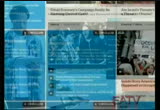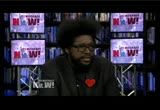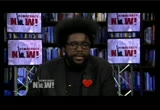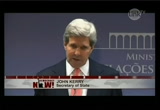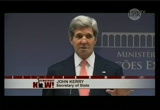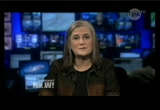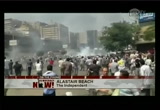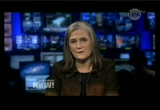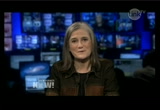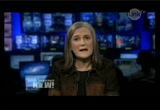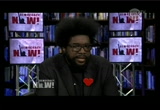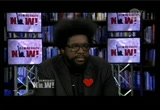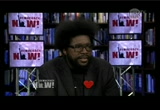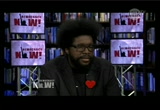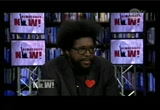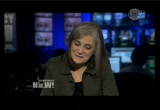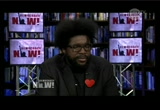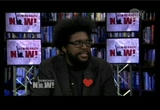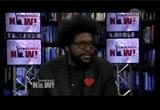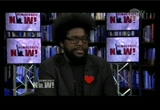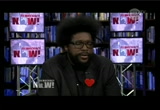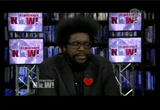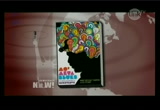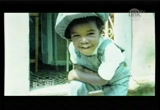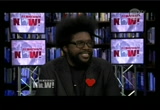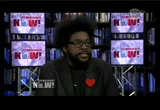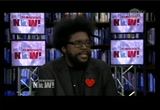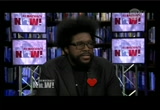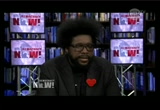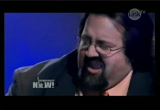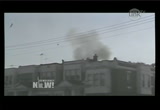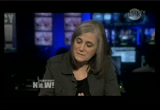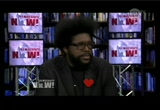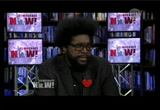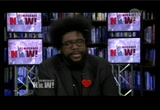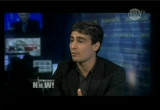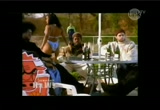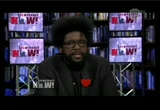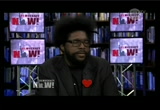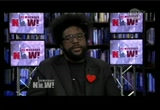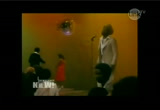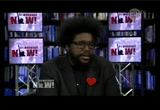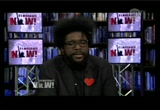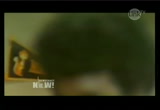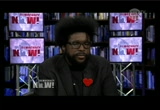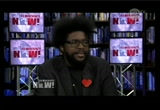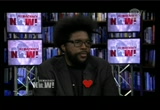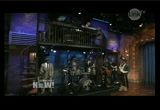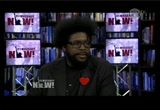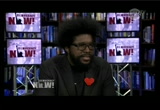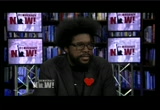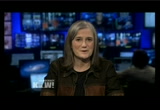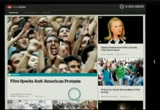tv Democracy Now LINKTV August 14, 2013 3:00pm-4:01pm PDT
3:00 pm
08/14/13 08/14/13 [captioning made possible by democracy now!] >> from pacifica, this is democracy now! the whole time i was thinking , please, don't look in the trunk. i felt like a criminal already. but the stuff i had in the trunk or psychology books and some scrabble games. in my head i was like, there is no way they're going to believe that that stuff belongs to me. rules stop and frisk
3:01 pm
is unconstitutional and we speak with ahmir "questlove" thompson, the house bandleader of late night with jimmy fallon, about racial profiling and how he has been stopped dozens of times by the police, most recently just weeks ago. we also talked about the 40th anniversary of the birth of hip- hop. "solid gold" was the show that the young black teenager was shown in a positive light, which had happened before. the only time you sought teenagers on tv was either mired in controversy, violence or protesting, being attacked by dogs, so this was the first time you really got to see another slice of light and it was important. >> we go to cairo for the latest on the deadly crackdown on egypt. all of that and more coming up. this is democracy now!, democracynow.org, the war and
3:02 pm
peace report. i'm amy goodman. egyptian forces have committed a new mass killing of muslim brotherhood demonstrators supporting the ouster president mohammed morsi. dozens of people have been killed in overnight raids on two pro more seeing cap mincing cairo. initial reports said between 42 to 94 bodies were counted at one more, including those of two babies. both sides have offered conflicting accounts, with the muslim brotherhood claiming an even higher toll of hundreds killed in the egyptian government giving a total of 13, including five egyptian state forces. in a statement, the egyptian government praised its forces for the "utmost degree of self restraint" in the face of what it called violence from protesters, the journalists and witnesses on the scene reported what appeared to be widespread and indiscriminate shootings with government snipers firing from rooftops on the crowds. in addition to live fire, egyptian forces used tear gas,
3:03 pm
helicopters, armored cars, bulldozers to clear the encampments. pro-democracy rallies are being held in bahrain and ongoing challenge to the u.s.-backed monarchy. ahead of the protest, the government sealed off entire neighborhoods and rated dozens of homes while warning activists of decisive measures. at least one major demonstration was organized or the u.s. embassy, prompting the embassy .o announce a temperate closure the sentencing hearing for army whistleblower bradley manning continues today at fort meade, maryland. manning is expected to give a statement for the first time since february and he acknowledged leaking classified documents to wikileaks, saying he wanted to show the american public the true costs of war. on tuesday, his defense attorney argued the military failed to recognize manning was suffering from mental health problems that should have triggered his removal from a war zone at the time of the leaks. the defense's case could wrap as early as today in a decision on
3:04 pm
manning sentence could immediately follow. israel has released the first wave of palestinian prisoners under u.s. brokered deal to resume peace talks with the palestinian authority. on tuesday, 26 prisoners were returned home to the west bank and gaza. most of them behind bars for over 20 years. the peace talks continue in jerusalem after their launch in washington last month. but on the eve of the new sessions and just hours before the prisoners release, the israeli government announced yet another new round of settlement construction in the occupied west bank. over 900 settlement homes were approved. this comes on top of the 1200 settlement units approved sunday . secretary of state john kerry insisted the ongoing settlement expansion does not threaten prospects of reaching a peace deal. >> the policy of the united states of america with respect to all settlements is that they are illegitimate, and we oppose settlements taking place at any
3:05 pm
time, not just the time of the peace process. said, the prime minister was completely upfront with me and with president a ass that he would be announcing some additional building that would take place in places that will not affect the peace map. john kerry was in brazil. he faced questions over edward snowden's revelation that nsa spying has expanded to all of latin america with brazil its biggest target. >> i have asked the people of on theto stay focused important realities of our the bilateral relations between our country which continue to grow stronger
3:06 pm
and stronger. brazil and other countries will understand exactly what we're doing, why and how, and we will work together to make sure that whatever is done is done in a way that respects our friends and our partners. and that is what we are going to achieve. >> brazil continues to demand an explanation from the white house on the spying. on tuesday, the foreign minister said the spying threatens to cast a shadow of distrust over u.s.-brazil relations. the oil giant bp has filed a lawsuit along the 2010 deepwater horizon oil spill. the environmental protection agency imposed the ban master, citing bp's lack of business integrity. in its lawsuit, bp says the ban amounts to abuse. those are some of the headlines. this is democracy now!, democracynow.org, the war and peace report. i'm amy goodman. news in to breaking
3:07 pm
egypt, forces have committed more mass killings. dozens of people have been reportedly killed in raids on two probe-morsi encampments in a row. we go to a cairo correspondent for the independent who has been visiting morgues were scores of bodies are reportedly being held. he says he is personally counted about 83 or 84 bodies today, most of them with one-shot wins to the head indicating that been shot by police snipers. he spoke to us from a hospital where the injured are being treated. i [indiscernible] the people are being treated on the stairs. [indiscernible]
3:08 pm
3:09 pm
there are bodies lying on the floor. [indiscernible] it is an extremely precarious situation. people.e hundreds of it is an ongoing situation. it is an extremely dangerous situation in cairo right now. reporter.s a cairo he is saying likely hundreds are dead as gunshots continued to ring out in cairo. this is democracy now!, democracynow.org, the war and peace report. i'm amy goodman.
3:10 pm
this week is widely celebrated as the 40th birthday for poppies again culture. on august 11, 1973, the new york dj kool herc held his first block party in the bronx. it was at these parties where he pioneered a revolutionary technique, using two turntables and two copies of the same vinyl record. he isolated the instrumental portions of phone, soul, latin, and even rock songs to create the long-awaited beats up form the basis of the hip-hop sound. combined with lyrical rhyming over top, rap music was born. this past week, he was joined by a number of hip-hop legends the new york central park for 40 years celebration. ahmir "questlove" thompson of the roots one in west philadelphia coming worse to music from an early age, he rose to fame is the cofounder and drummer for the roots. while most rap music comes from machines andum
3:11 pm
samplers, the roots create their sound through live instrumentation. they have helped define a new generation of neo-soul and conscientious rap. today, they are well into their third decade. there are the house ban on nbc's "tonight show with jimmy serving with questlove as musical director. he is a high demand dj. he is also non-author come out with a new memoir, "mo meta blues: the world according to questlove." tuesday, we sat down with questlove to discuss his new and the killing of trayvon martin. first come on the heels of this exist work ruling declaring the stop and frisk tactics of the new york police department unconstitutional, i asked him to talk about his own experience with racial profiling. he talked about his first time king stopped as a teenager in philadelphia. >> there was a point where i was
3:12 pm
coming home from bible study on a friday night and there's a tower records on south street. a friend of mine wanted to 's allen that just came out. he wanted to study the record before they came. so we went and purchased the album and were driving home and seconds later on washington avenue in philly, cops stopped us and holding a gun on us. and is nothing like the first a gun is held on you. like, we are 16, 17 years old, mind you. i just remember the protocol. i remember my father saying, if you're ever in this position, keep your hands up and move slow
3:13 pm
. he did it in a humorous way like richard pryor did. it was that type of thing. i remember that lesson. my friends didn't know that, so they just thought it was normal. i was like, get your hands up, get your hands up. how i knew that was the protocol it ist young age, i mean, probably sad commentary, but it was also, you know, a matter of survival. >> you know the judge just handed down the decision saying stop and frisk is unconstitutional in new yo. >> i was highly shocked. that is something that just came out of left field because i was also wondering, you know, will stop and frisk just be a way of life? weeks ago -- iee was not frisked, but i was for unknown reasons that
3:14 pm
i was just the wrong person in the wrong automobile. >> to exhibit? >> yeah, i get stopped all the time. >> tell us about the last time. >> i was leaving my thursday night residency. i do a regular dj night in williamsburg and right before we got on the williamsburg bridge, we got pulled over. they walked up and asked to see license and registration. there were four of them with flashlights everywhere. i played a risky card. i was like, i pulled us out of my backseat and was like, this -- nine times out of 10 when i play that card, never works. >> showing your book, you mean. >> yeah. where ised to know,
3:15 pm
your new york taxi license? i have my own car and my own driver. by the questions they were asking, i knew they did not know who i was. to them it was like, why are you sitting in the backseat like a don and you had your driver up there? so i showed them the book and they looked and kind of had a meeting for five minutes. then like, ok, you can go. but this happens all the time. >> how many times would you say you have been stopped? >> in my lifetime? the memorable ones, probably six times. but it is definitely in the 20s and 30s. since 1994, probably 20s and 30s. the worst one was after super tuesday in orange county. campaigning for super
3:16 pm
tuesday -- >> for obama? after it wasread over, a friend of mine, journey small who is an actress on "true blood" she and i were campaigning and decided to see a movie. after the movie we went to borders because i wanted to get a housewarming gift for my ran a juror. and we pulled over. i pulled over to take a phone call from my integer. i thought being a law-abiding citizen, you're not supposed to drive and talk so i pulled over five cars you and stopped us and pretty much that was like the most humiliating experience. we had to get out of the car. they made us spread on the car. of -- in the back >> their cruiser. >> yes, their car. the whole time i was thinking,
3:17 pm
god, don't look in the trunk. already.ke a criminal i thought, i've got stuff in the trunk. but the stuff i had in the trunk work psychology books and some scrabble games. in my head i was like, there is no way they're going to believe that that step belongs to me. like, there is no way. she is trying to get her camera phone, "this is illegal search, this is unconstitutional." this is like the night before the grammys. the night before the grammys in 2010 when i won. it's like, this happens all the time. >> so all of these examples you have given up being stopped, can you explain? we hear -- it has been ruled illegal in new york, but what does it do to you? >> it is absolutely probably the , lowestiliating, lowest
3:18 pm
feeling a human being can have. twice this happened in front of dates. all i kept thinking about was, man, nothing is more emasculated -- then to be emasculated in front of a girl you like. there is no coming back from that. it is sort of an unspoken thing. i felt even afterwards, there is this unspoken cloud of the question of my manhood because, you know, that is why i'm often shocked when i see footage of people and they talk act to cops? like, i want to do that, but it watchingyou know, even "fruitvale" i'm like, just get on your knees because you can die.
3:19 pm
humiliating,t emasculating feeling i've ever had. i only feel low when that happens. playful. and never we finish a roots album, i give -- whenever we finish a roots album, i give it the car test. i once got stopped three times driving up and down the street. the first two times they were like, it's you, we'll let you go read the third time, it was like, man, it's you. i felt safe enough to have casual banter. i was like, this is the third time i have been stopped, what's going on here? know, like, well, you you're in temple university's neighborhood. i was like, and? he was like, look at the car you're in. i drive a scion. my logic for getting the car was, don't get a flashy -- i
3:20 pm
come from the 1980s. in the 1980s when he saw someone in a mercedes or bmw, they automatically got pulled over because they were druglords. i thought, ok, i will get a scion. first of all, it was free to me. but it was boxy and did not smash my afro down. it is a comfortable car. i like it. he said, you kind of look like you stole it from a college student. i was like, ok, i get it. even choosing the car in my mind that would sort of not putting my position, it wound up putting me in that position by me driving the car. he said if you are in an suv, we would just have thought you're are one of the philadelphia eagles or something. >> and by street test, you mean you play the album in your car? >> most people, when they
3:21 pm
finished their records, they try and find a really good speaker system. when you mix your records, you do it on horrible speaker so if it sounds good on portable speakers, it will sound great elsewhere. when you finish your record, the first thing you want to do is take it into a good car system. satisfactory, but i just wanted to drive around with it. i do it with every roots album. i drive around for five hours making sure i like the mix. i just happen to drop between 2:00 a.m. and 4:00 a.m. and that was another unfortunate circumstance. even then it is like, what do you do? how much more can i play is safe? purposefully taking myself out of situations because i want to avoid that, but i don't know how much more i can suppress myself to not seem like
3:22 pm
a threat or be a threat. so after the george zimmerman trial, he said, i don't know how to not internalize the overall message this whole trayvon case has caught me. to get atm struggling least one percent of the feeling back from all of this protective numbness i've built around me to keep me from feeling. what did you mean by protective numbness? > >> there is a bit of our soul that melts away when things like this happen. first of all, you internalize it. as i watched the case, i identified with trayvon martin. ok, that would have been me in that situation. there have definitely been times when i was watching either a sporting event or the grammys or
3:23 pm
any sort of television event and then i be the person who would run to the store to get something. that could have easily been me. i have a hoddie shop. i love them because it gives me anonymity. i can go to movies and no one bothers me. if i go looking like this, it will be problematic. for people listening on the radio and don't know questlove, he has pretty distinctive hair. >> i am captain obvious. so when the verdict was handed down, i just felt like half of me -- i instantly felt like, well, i knew that was going to happen. the other half of me was upset that i had just resigned to that fact.
3:24 pm
because i was on an international flight, i was in holland the day the verdict was handed down, so that whole eight hour trip on the plane i just felt like, oh, nothing matters matter, life doesn't like, you're guilty no matter what and you just now have to figure out a way just to make everyone feel safe and everyone feel comfortable, even if it is at the expense of your own soul. in talking to my manager about it, who was the first human i talked to after i got off the airplane, he also was sort of echoing that read like, well, why are you shocked? .ou knew this was the outcome why are you shocked? why are you letting it get to you? i felt like i was going to explode and i had to talk to somebody, so i just started to write. one person asked if they could
3:25 pm
put this on their blog and it kind of spread. the ripple effect happened. >> ahmir "questlove" thompson, legendary hip-hop group roots. he is dj music scholar and author of the new memoir, "mo meta blues: the world according to questlove." we will be back with the conversation on this 40th anniversary of hip-hop in a minute. ♪ [music break]
3:26 pm
>> this is democracy now!, democracynow.org, the war and peace report. i'm amy goodman. to ahmireaking "questlove" thompson, the hip- hop musician, dj, best known as the drummer of the group the roots, the house band of "late night with jimmy fallon. he is out with his latest book, "mo meta blues: the world according to questlove." i asked him to talk about his childhood and family. oldies doer was an
3:27 pm
well, i will say, legend, philadelphia. he had a group. his time was during the late 50s, early 1960s. they are uploaded in the 1960s, 1961. my mother was a print model from pittsburgh pennsylvania. they got married, had my sister, had me in the early 1970s. i guess that was the first wave of nostalgia for the do-wop generation, or baby boomers. i grew up in an atmosphere in clarkbackstage at the withsha na na and harvey and the moon glows, all of these 1950s
3:28 pm
luminaries. i kind of thought that was contemporary music and by the time i got to the first grade, one of our assignments was bring your favorite single and your favorite 145. kids were bringing in "night fever" and "shadow dancing" and "disco duck." they were looking at my music and there were like, this is an old record read this came out when i was a kid. i couldn't understand. i felt like my parents had played a trick on me. but it is kind of happening now, even with the kids of my bandmates, some of them are growing up thinking that "off- the-wall" by michael jackson came out last year. >> your drumming at what age? >> i was two years old. my birth doctor was also a child psychologist.
3:29 pm
werehim and my parents hippies trying to readjust to times in the 1970s and my doctor told my mother, let him -- he was curious to see if the traits of my father, a singer and musician, would be passed to me in some sort of indirect way. he kind of told my mom, let him be creative. if he wants to make mud pies out of his mashed potatoes, let him do it. if you wants to draw on the walls, let them do it read in black households, you don't do that. there is plastic covering everywhere . letpecifically told them, him find his creativity, let him destroy stuff, let him build wings. things.m build
3:30 pm
i did those things and i guess they had to refocus it and by the age of three, they got me a toy drum says so i wouldn't break the coffee table anymore and that type of stuff. >> when did you first publicly perform? >> ok, so my parents didn't believe in babysitters in the early 1970s pre-and i had to travel with them. i will say he left that oldies madison square garden in 1975 and started a nightclub circuit. clubs and to night djs play. and djs play. in the 1970s, they hired bands. my father came up with a nightclub act that kept him busy maybe 150 nights out of the year . i would often come to these shows. they didn't believe in babysitters, so pretty much i will say i was my father seem in
3:31 pm
gps by the age of seven or eight. i could navigate through a rand mcnally map like that. i could get us to virginia, connecticut pre. then when i was nine years old, he taught me about technology so i started working the monitors, the soundboard. i 10 years old, i was working the spotlight. all of this time i was wondered, wait, didn't the nightclubs have a problem with the 10-year-old running their system? i would get there, get the ladder and say, no, no, we need a magenta color or pink. i was that color. the musician had gotten an accident and sprained his arm. it was the drummer fo. he was like, you know the show,
3:32 pm
you drum. i was 12 years old and my first gig was at radio city music hall. that is how i got my feet wet. >> tell us about your high school years. he hates when i tell this story, especially now that it is immortalized in the book. he says it wasn't on the first or second day of school, but i definitely feel it was the first three months. this was my first time in a public school experience because before, i was just in private schools up until -- i was in private schools up until the 11th grade. at philadelphia high school creative and performing arts, i was in the principal's office getting a free bus token.
3:33 pm
subsequently, he was getting ejected and suspended out of school for doing something that he shouldn't have been doing in the girls bathroom with who knows what. that is how we kind of met because he became a legend. he was a freshman in the bathroom with this girl and he became like the man. that is how i knew who he was. i think the way we started the group was by accident. i was trying to impress the prettiest girl in the school, so i think i lied and said i had a group. it was about, who is going to perform at the talent show for the valentine's day talent show. i was like, yeah, i've got a group, you know. really? yeah, with him, right there. i ran up to him and said, look, if anyone asks, we are a group. by the way, we are going to do the talent show. >> and he wanted to do it --
3:34 pm
>> he had decided in his mind that he, too, wanted to form a group because there was a girl he was trying to impress as well. so his motivation i think was to upstage one of our classmates who eventually was in boyz to men. you had an amazing school of musicians, artists. show extrashe cosby were in our school and a lot of -- the world of jazz now, these are guys that i went to school with. consider the greatest organ , christianazz mcbride who is basically our generations mangus. kurt rosen winkle.
3:35 pm
people who are now trailblazing in jazz now were young minds when i was in school. >> and this was west philly. >> i was born in west philly, but the performing arts school was in south philly. i lived on osage avenue. >> tell us the move house was bombed. >> most people think it was may 13, 1985. philadelphia historians note that as the day our mayor gave permission to ball my block. i was eight blocks away from where that happened, but cars weren't allowed, you see news camera people ducking because it was a standoff between the moon work organization and philadelphia police. i mostly know that day as the day my high school girlfriend dumped me, so, you know, i kind
3:36 pm
of came home wallowing in self- pity and then literally five heard it.ter you we went outside and i thought it was just a gun battle. once i turn on the news, i realized, oh, god, they bombed that house. four hours later, we did not know whether we had to vacate because one fire had spread to three houses and then two blocks and then three blocks and then we thought, ok, four hours from now this is -- the first thing i did was grabbed my favorite records in my soul train collection. i had them just waiting just in case, but the fire never reached 52nd street. >> the bombing killed 11 people, five of them children. how did that affect you? >> at the time, you know, i don't know how -- i mean, i didn't know that much about it
3:37 pm
happened to what them in 1977 by frank rizzo, sort of humiliating them and making them walk outside naked and beating them -- >> the mayor. >> yes, the mayor frank rizzo. yeah, i mean, it is a wonder that we survived as a city with him in office. and at the time, it didn't , oh, we areme that seen as the enemy. everyone wants to grow up with --i was a middle-class existence. you were told, officer joe is your friend and that type of thing, but that was also around which i also started to quietly learn, oh, maybe i
3:38 pm
could be in this position in a snap. >> ahmir "questlove" thompson we are talking to and his book is just out called, "mo meta blues: the world according to questlove." we just passed what many call the 40th day of hip-hop, august 11, 1973, 16-year-old jamaican immigrant named five campbell later known as kool herc held his first block hardy in the bronx. any talk about the significance of that day? deserves his own -- it has always been my dream to establish a hip-hop version of the macarthur genius grant or something like that, simply because he took from his birthplace of jamaica the idea of jamaican hosting jamaican parties. they built their own speakers
3:39 pm
and go into the park and play these records. he took that and applied them to soul records. more specifically, a lot of obscure soul records that were ignored but had a special element to them that seem to be the favorite, which was basically the drum braking, the idea of giving the drummer something, which you don't take a solo. you just let the drummer play the break for a mars and that is always the highlight of any 1970s record. that was your time to get down. that was the most exciting part of the sound. for him to take that technology and that idea and bring it to the masses, you know, not only kool herc but others. kool herc is known for the idea of large speakers reed in jamaica, they built their own woofers and tweeters and had the
3:40 pm
loudest speaker systems ever. ♪ wisely donatedho his 40,000 records to a new york museum for display, the actual record collection that invented hip-hop, he was more or less known for his obscure selection. ♪ me the real definition of hip-hop is going to the bronx river projects and playing "the monkees" and "the beatles" and your audience not being the wiser. there is a drum brake in a reprise of a song that is a beach boy favorite. you play that for five minutes and nobody knows it is "the beatles" they just see it as a
3:41 pm
great drum brake to dance to. scratching, and grandmaster flash who did so many innovations with the turntable, i mean, it is the birth of a hip-hop nation. it is very important. even have beenot a part of it, but i am actually happy to bear witness to it. to me, that is probably the last american music revolution, in my opinion. >> can you talk about the incident you describe in the book with editorialistsb/i/g -- victorious big. manifesto that you burned when he was killed. >> 1996i guess you could say was a crucial year for hip-hop
3:42 pm
culture. basically, that is when i think the apartheid movement started inside. suddenly, there were haves and have-nots. i was starting to see the results of a because on my lock, kids were like, why do you still take a cab? you're just on bet, why are you taking a taxi cab? how come you never wear jewelry? a rap star, are you supposed to have these things? i wanted to do a video that pretty much showed being an artist is not about being a personality, but more or less a human being. generationt the principles of hip-p p p hop♪
3:43 pm
unfortunately, the commentary had cut a little deep with some in the hip-hop community that felt we were taking potshots at them. what i didn't know was that we had taken -- we had taken a swipe at an actual biggie video. i was not aware we had done that. of course i could see how you would think we were mocking him because this is exactly his video scene. so he wasn't too happy about that. the thing was, we were always in europe. toody in hip-hop ever wanted tour europe, especially when they were successful in the states. , "it's onrd talk of when i see them." at the time, the source magazine had asked me to respond to the statement of how biggie was upset.
3:44 pm
he championed us and a lot of books, so this really came as a swipe from his point of view a in, wait a minute, i said they were one of my favorite groups ever, why would they do this to me? so my manager and i, the same manager that does the commentary in my book, the footnotes, we wrote a manifesto about how we see the dangers of the seeds that is the apartheid movement, the fact that hip-hop used to be an all-inclusive thing. when run dmc sang about my adidas, you can get apparent that like you belong in it. and now rappers are like, this is -- it is like the trayvon thing over again. you ain't ish. like, i have something and i'm better than you. hip-hop used to be inclusive.
3:45 pm
we wrote this nine-page manifesto and on the morning of march 10, i called the source offices to fax them this before the -- this was before the thernet -- to fax it and person was like, well, i don't know. you do know what happened, right? i was like, no, what happened? they were like, biggie is dead. i really felt horrible. one, i was like, wow, he actually left earth thinking we were really going at his neck and we weren't. we were kind of going at the neck of the idea of what was about to happen. eventually, that is what happened. is sort of separated. now, if you're not part of the winners circle, no one aspires to be the working man. everyone aspires to be "the"
3:46 pm
man. it manifested. unfortunately, he was part of that manifestation. >> ahmir "questlove" thompson, drummer, cofounder of the roots, nightuse band of "late with jimmy fallon" is also author of the new memoir, "mo meta blues: the world according to questlove." when we come back, he talks about working with jimmy fallon. stay with us. ♪ [music break] >> this is democracy now!, democracynow.org, the war and
3:47 pm
peace report. i'm amy goodman. we are speaking to ahmir "questlove" thompson of the group the roots. he is out with his first book, "mo meta blues: the world according to questlove." it is the 40th anniversary of hip-hop. i asked questlove to talk about the tv show "soul train" and its host don cornelius. first, a few highlights from the show. ♪ >> soul train, the hippest trip in america. ♪
3:48 pm
wish you love, peace, and soul. >> ahmir "questlove" thompson, you have a book coming out soon about that show and you tweet pretty frequently showing the lips you have in your personal library. probably -- i" is grew up in a household where tv really wasn't allowed unless it was educational programs or pbs. and music programs i was allowed to watch. often my parents would let me wake up a little bit after musical acts.tch train" was probably the most important show of all video, before the age of
3:49 pm
where you going to see your favorite act perform? , youis how i got to know know, musicians i admired. earth, wind, and fire, the manhattan's. but "soul train" greatest trick was that it taught african americans afro centricity, which is probably -- that is don cornelius'greatest trick was to use the commercials. johnson hair products were the sponsor of the show, so he used those afrosheen commercials and altrasheen cosmetic commercials to basically teach about african pride and taking pride in your self, which was important time, to beng that called an african when i was a kid but that was like a sign of shame. that was the worst diss.
3:50 pm
it was like, your mama so fat, would she get on the scale is says, to be continued. oh, yeah? you dirty african -- then it was time to fight. teachingin" ended up without you even knowing it, and that is the beautiful thing. one of their first campaigns was afro sheen, teaching them swahili while applying their hair or having frederick douglass -- teach you how to style your afro . or the story of annabe hannibal. to me that was a sign of brilliance. even without knowing it, he was teaching you pride free at this whole goal was to show the young
3:51 pm
black teenager in a positive light, which hadn't happened before because the only time he saw teenagers on tv was either mired in the controversy, violence protesting, being attacked by dogs, hosed down. so this was the first time you really got to see another slice of life and it was important. i felt like that is my passion project. i own about 600, 700 episodes of the show. >> ahmir "questlove" thompson, can you talk about jimmy fallon and talk about the whole rootsence, talk about there and what you're trying to convey, what you're doing? >> at the end of the day, this is probably the best move for us. we took the move knowing we would be severely underestimated . i think salon.com one said the do aof roots going to
3:52 pm
fallon's show was equivalent of miles davis but coming -- becoming a street musician. that is the kind of energy i you i going into it for wanted people to underestimate us because i personally wanted to make this a cool thing. i did not want to make it like community college. everybody is like, yeah, i go to city college, but i'm going to nyu in the fall. i didn't want to make it a shame-based thing. it is probably one of the best experiences ever. starters, much to people surprise, this is the only time the roots have ever rehearsed as a band. we never, ever rehearsed as a group when we were the roots because we are just spontaneity- based. .e don't plan stuff for yo
3:53 pm
this made us better songwriters, craftsman. >> for nbc to bring on a rap group? --there was concern over jimmy is very excited about a lot of things. but theyd his back, were basically like, look, jimmy is over the moon about you guys but, look, this is what you have got to understand. we know you're good, but can you be good and have range? i think the question up in the air was, how much range do they have as musicians? we know they give a great show. we know they are a good rap group, but what if kenny chesney comes on the show, can they pull it off? what if we say we need andrew lloyd webber reference, can they
3:54 pm
pull it off? so we were there on a probation period. it was going to become every 12 weeks we will have a meeting of whether or not the roots fit the show or not and if not, we will just get regular, real musicians. so they invented this it of "free styling with the roots" in randomly nameuld a genre of music and also name facts about the audience member next ahead and we would have to make up songs on the spot. the very first time we did it, then i started to notice a lot of people peeking their heads in the ram for it i could tell, executives, executives, executives. it was like make or break moment for the roots. we are like, this is the moment we have been waiting for. once we did it, just a collective sigh of relief from the entire staff. they threw the probation thing away. of?hat are you most proud
3:55 pm
as move onto this mainstage of "the tonight show" from "late night," social justice and the you are imbued with it, driven by it, what you most want to accomplish still? got to tell you, that is the hardest question i have ever had the answer. just like chapter one was the hardest -- that was the last thing written for this book because i couldn't answer the question, why is my story important? know how i program myself, but i never -- iowa's felt like the downfall of any artist was to -- kind of like this theory of if i ever did this and that to my compos mentis, i would turn into a pillar of salt or something.
3:56 pm
i can't tell you what i most proud of. i am extremely grateful that i made it. some days i feel like, ok, i did stuff. other days, you know, most days i just feel like i haven't made my mark yet, i got a long ways to go. a lot of the times i feel like it will be the downfall of me if i say, you know, when we did this or when i met this particular person or we won this. a whole life is full of super highs. the average everyday person, life highlight is an everyday occurrence. half the time i can talk about it because it always seems -- they have this thing called humble brags on twitter. i can just say, the other day i jay-zth dah dah dah and
3:57 pm
walked in and was like dah dah dah. that is humble brags. i am grateful to have survived, literally, just survived because i am still wondering would anyone in the hip-hop culture ever make it to 65? when we have our first hip-hop senior citizen, that is an amazing thing to me. if they escape bullets, they still have to escape strokes and their health. pack.are two leading the they are in their mid-to-late 50s, so it looks like they will get to the finish line. to me, that is an amazing achievement. all i want to do is have the option to want to do this. i don't want to be escorted out the building because i'm too old to do something or not have the ability to do it. i love my life the way it is.
3:58 pm
>> ahmir "questlove" thompson drummer and cofounder of the house band of "the late night with jimmy fallon. he has just come out with his book "mo meta blues: the world according to questlove." for moreocracynow.org of our interview. appearanceout how an by stevie wonder on the cosby show influenced a generation of hip-hop artist and whyq has been called the paul revere of occupy wall street. this is democracy now!, democracynow.org, the war and peace report. i'm amy goodman. democracy now! is looking for feedback from people who appreciate the closed captioning. e-mail your comments to outreach@democracynow.org or mail them to democracy now! p.o. box 693 new york, new york 10013. democracy now! [captioning made possible by democracy now!]
61 Views
Uploaded by TV Archive on

 Live Music Archive
Live Music Archive Librivox Free Audio
Librivox Free Audio Metropolitan Museum
Metropolitan Museum Cleveland Museum of Art
Cleveland Museum of Art Internet Arcade
Internet Arcade Console Living Room
Console Living Room Books to Borrow
Books to Borrow Open Library
Open Library TV News
TV News Understanding 9/11
Understanding 9/11